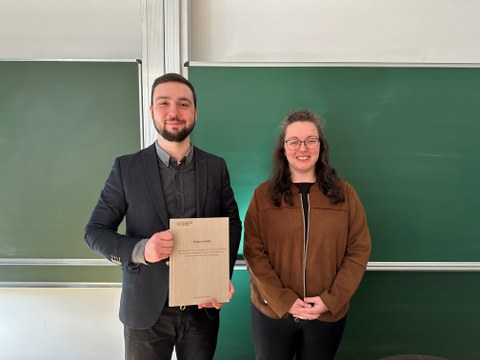Mar 22, 2024
We congratulate Mario Martin Poch on the successful defense of his diploma

Mario Poch after his diploma defense with his supervisor Antonia Sikotakopoulou, M.Sc.
On 18 March 2024, Mr Mario Martin Poch successfully defended his diploma thesis on "Experimental investigations into the conversion behavior of various fuels containing carbon fibres in a continuous fluidized bed furnace". The thesis was supervised by Antonia Sikotakopoulou (M. Sc.).
The task was to draw up conceptual and design recommendations for setting up a fluidized bed combustion system for combustion tests with CFRP fuels based on a literature review. The focus was on the fuel feed, the provision of temperatures in the range up to around 850°C and an adapted exhaust gas analysis section.
The thermal treatment of such a material is a current challenge for the industry. Especially when using a fluidized bed combustion system, adjustments are usually necessary to ensure the proper treatment of the material.
Theaim of this work was to approach the topic as part of a feasibility study and to answer the question of whether and under what technical and design conditions a fluidized bed combustion system is suitable for the thermal treatment of CFRP waste.
New concepts for the technical adaptation and operation of this plant have been developed based on the experience of other projects on the combustion of CFRP fuels and previous projects at the existing ZET test plant. Further proposals for optimizing the existing plant for future, continuously operated combustion tests were also drawn up. The concepts developed primarily concern the system components of the charging group, the integration of additional heating elements to achieve the required temperatures in the combustion chamber and the installation of a flue gas measuring section to record relevant measured variables.
Mr. Poch comments: " Two test plans have been drawn up which are suitable for the different operating modes of the experiments. A first test plan for semi-continuous trial operation in order to be able to classify the process conditions of the converted plant and a second for the future series of tests on the conversion behavior of various CFRP fuels.
The experiments after the conversion of the fluidized bed system can be used to investigate further questions by varying the target temperature ranges up to approx. 850 °C. In particular, the observation of the residence time distribution during the combustion of different CFRP fuels depending on the composition and type of matrix material as well as the different fiber types are key areas of investigation. It would be conceivable to realize an additional external recirculation of the particles separated in the aerocyclone back into the combustion chamber. If it turns out that the internal cyclone cannot achieve sufficient separation efficiency for the increasingly smaller fibers during combustion, external recirculation would increase the residence time and thus increase fiber conversion."
